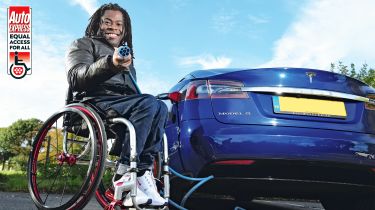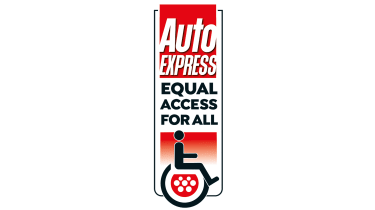Ade Adepitan backs campaign to make electric cars accessible for all
Tesla-driving TV presenter, environmental campaigner and wheelchair basketball paralympic gold medallist speaks out

TV presenter and paralympic gold-medallist Ade Adepitan has backed Auto Express’s call for action on accessibility to electric cars for disabled drivers, after we shone the spotlight on a woeful lack of accessible public charge points in the UK’s near-30,000-strong network.
“It’s a great campaign, and Auto Express is to be congratulated for taking it on board,” Adepitan says, “Am I surprised by your findings? Absolutely not. As someone with a disability, and like most people in the disability world, I’m just used to it.”
Our report revealed a shocking lack of consideration of accessibility needs in the UK’s public charging network, with providers seemingly in a wholesale breach of Equality Act 2010 obligations, and Government lagging on legislation with consultations only just beginning.
“It’s really frustrating,” says Adepitan. “What it’s going to take for things to change is when this matters to people who do not directly benefit from it. Disabled people can shout until they’re blue in the face, but unfortunately we’re not the majority and people tend to forget about us when they’re planning. It’s such an obvious oversight.”
Adepitan has driven a Tesla Model S adapted with hand controls since 2016. As an environmental advocate, he uses trains and his wheelchair as often as possible, but has racked up almost 40,000 miles in his EV.
“I’m so lucky because I’m a really able disabled person, but there are so many charge points that are rubbish. I’ve been cursing and swearing so many times; If I get too close to the charge point, then I can’t open the door to get my chair out, and if I go further away then I’m too close to the car beside me. Other chargers are either too high and you can’t see the screen, or they’re in an awkward position for you to plug the cables in. The Tesla charge points are not perfect, and I’ve seen a lot worse, but sometimes I need to do a wheelie bump up the pavement, or there isn’t space for my chair. So yeah, I find it really frustrating.”
As a committed environmentalist, Adepitan believes EVs are the way forward, in spite of the obvious challenges. “The only comfort is that I’ve got an EV, which I’m happy is doing less harm to the environment than a ICE car,” he says. “But is the infrastructure perfect? Far from it. Does it work for the disabled community? Absolutely not.”
While it can be really hard to get charged, Adepitan says it’s not impossible, and he’s keen to encourage other disabled users to take the plunge. “It’s awkward, but that’s just like the public transport system, and challenges aren’t new to any disabled person,” he explains. “It will be frustrating, and I don’t want to scare people away from electric vehicles, but that’s where many [disabled people] are.
“We need to get more disabled people driving EVs, and then when we have a strong enough lobby, then we have the power to say something about it.”
In order for things to change, Adepitan believes everyone needs to be more aware, saying: “Look around and think, if I was in a wheelchair or if I had cerebral palsy or any sort of motor impairment, would I be able to use this?
“God forbid it happens, but any of us could become disabled tomorrow. And do you want to wait until you or someone in your family ends up in that position before you start kicking and screaming?
“You’ve got to start doing it now if we’re going to try and create a society where all of us can get around and feel independent,” says the wheelchair basketball paralympian.
Auto Express Equal Access For All campaign

Find a car with the experts





